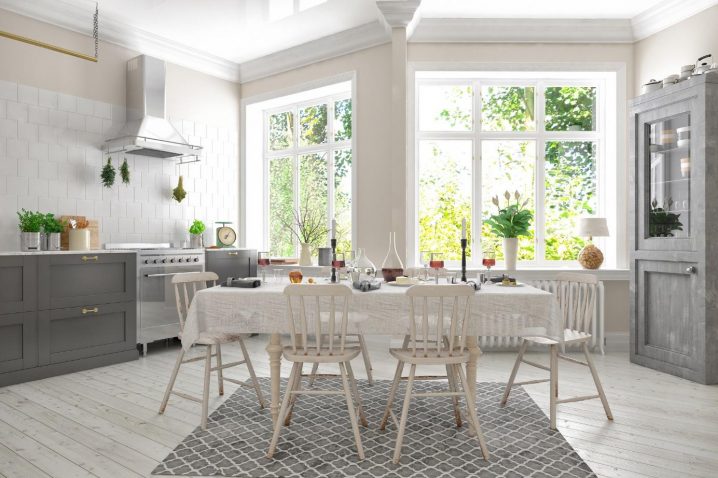The dining room is the heartbeat of home-based socializing for many people today. So it’s only natural that you want your dining room to be as balanced, welcoming and inviting as possible. The best part is that it doesn’t matter whether your dining room is the size of a postage stamp or a football field.
What matters is that you choose complementary decor that is appropriate for the size and shape of the space you have. Read on and learn fun ways to use the art of feng shui to add ambience and good energy to your dining room space.

What Is Feng Shui?
Feng Shui (“foong – shway”) is an ancient Chinese art of balancing energy, form, and function inside a space. The word “feng” means “wind” and the word “shui” means “water.” Here, however, this 3,000-year-old discipline is not talking about adding more wind or water to your rooms. Rather, the emphasis is on balancing all the natural energies, or chi, to optimize your life.
Feng Shui Dining Room Tips
To optimize the chi in your dining room, it is important to consider not only the space and its purpose, but its relationship to adjoining spaces and the greater surroundings as well. While you can’t always control what is located next to or beyond your dining room or your home itself, you can do a lot with feng shui to enhance your existing space.
Lay out the basic design and flow of your dining room.
Feng shui enthusiasts recommend placing your dining room table and chairs away from the entrance into another room, a bathroom door, or the kitchen. Also try to avoid placing your table too near any window that overlooks a busy street (a quiet street is fine). Ideally, place your table and chairs near a window that faces a quiet area with lots of natural light.
If you live in an apartment or condo and are not on the top floor, try to find out what type of space is directly above your dining room itself. If it a bathroom, consider moving your dining room to another area of your home if at all possible. In feng shui a dining room should never be directly beneath a bathroom for hygiene reasons.
Choose your dining room furniture and accessories.
The art of feng shui calls for choosing a rounded-edge, natural wood table, if at all possible. Do your best to choose a table base that has legs supporting the table equally (i.e. not a pedestal-style base). This promotes unity and balance, two key concepts associated with feng shui.
Do not place overhead light fixtures directly above the dining room table as this can feel slightly claustrophobic to diners. If you can place them in an offset position or skip overhead chandeliers entirely, this is best. For decoration, think more minimalist. Steer clear of clutter in favor of a few striking pieces.
For example, one larger piece of wall art and a striking table centerpiece. Strategically-placed wall mirrors can help a very small dining area seem larger than it is and can be a great choice of wall art for smaller dining rooms in particular.
Choose your dining room color scheme with care.
Dining should be an enjoyable and relaxing experience for the body and mind. In western color psychology, the color red is said to promote hunger. And loud, fun, bright colors may be great for some rooms (such as a craft room or kids’ room) however, feng shui encourages adopting more muted, neutral tones in the dining room.
Earth tones are grounding and calming to promote excellent digestion and a peaceful dining experience. To create this feel, you can accent neutral earth tones such as ivory, tan, buff, sand or beige with soft pastels like pale yellow and natural plant greens such as olive or sage. These colors all work well together and allow the meal itself to take center stage in your dining room.
Keep electronics out of the dining room.
Finally, if you feel tempted to install an entertainment center in the dining room, reconsider. Traditional feng shui emphasizes that the dining room is about building interpersonal connections in a low key, balanced, harmonious setting. So leave the entertainment center out, but consider adding a source of natural flowing water for some ambience instead.
A fish tank, especially if it includes goldfish, is a great choice. Goldfish are considered lucky in feng shui design. Choose one black goldfish for protection and the rest golden-colored goldfish. With these feng shui principles in hand, you will be able to design a dining room you and your family and friends will love.


